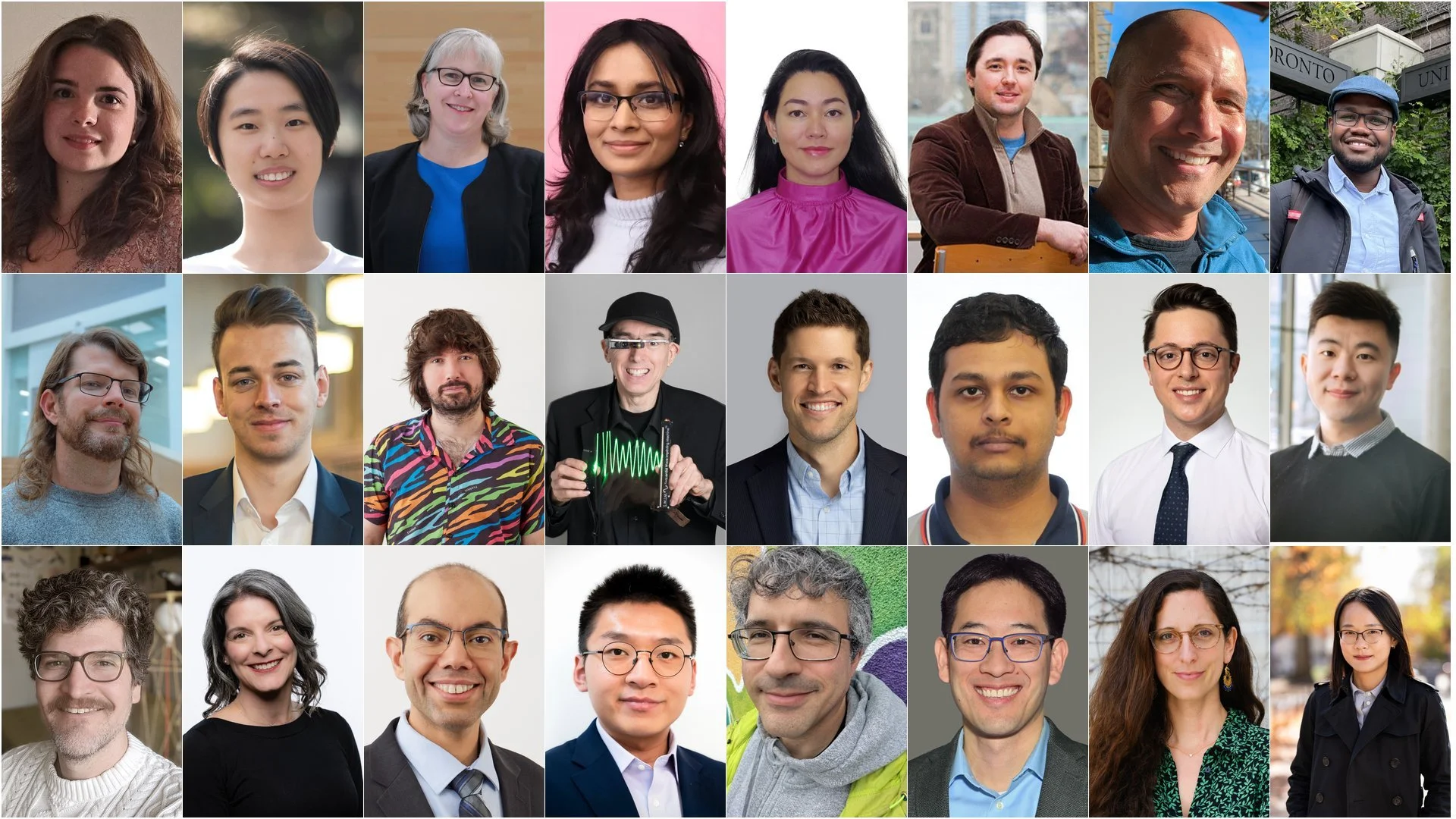2024 call for Schwartz Reisman faculty and graduate fellowships now open
The Schwartz Reisman Institute for Technology and Society has launched its call for 2024 Schwartz Reisman faculty and graduate fellowships, open to University of Toronto researchers whose work explores the social impacts of new technologies.
2024 applications are now closed. Learn more and apply for 2025 Schwartz Reisman Institute graduate fellowships.
Are you a University of Toronto researcher who is dedicated to ensuring that advanced technologies benefit all of society? Do you believe that artificial intelligence (AI) and data-driven technologies can, if properly harnessed, enable a more equitable and democratic society—one in which values such as fairness, diversity, human rights, and sustainability are promoted and respected? Would you like to collaborate with a vibrant research community and engage in new conversations with leading scholars from a wide range of disciplines?
The Schwartz Reisman Institute for Technology and Society (SRI) is excited to announce our 2024 call for faculty and graduate fellows, available to current members of the University of Toronto community across all three campuses.
Graduate fellowship terms are one year, while faculty fellowship terms are two years. Applications are now open. Candidates must submit their application no later than February 4, 2024 at 11:59 PM ET.
More information on Schwartz Reisman fellowships and program application forms are available here:
What is the Schwartz Reisman Institute?
The Schwartz Reisman Institute for Technology and Society supports world-class research to generate new frameworks for understanding the impacts of powerful technologies on society, and the laws, institutions, and social values that mediate them. SRI’s mission seeks to advance approaches that are responsible, ethical, and beneficial to all of humanity. We support ground-breaking interdisciplinary research and actionable solutions by bringing together scholars from humanities, social sciences, and STEM fields to spark new conversations, ideas, and approaches.
Through our events, discussion groups, and research projects, SRI supports a vibrant academic community with the skills and knowledge to address today’s pressing issues at the intersection of technology and society, by supporting interdisciplinary and multidisciplinary research approaches, and advancing new areas and subfields of inquiry.
Regular SRI activities include our weekly SRI Seminar Series, which presents cutting-edge research at the intersection of technology and society, and our annual conference Absolutely Interdisciplinary, which pairs thinkers from different disciplines to discuss common questions in new ways. Our special events include discussions with experts at U of T and beyond on topics such as the future of AI alignment, how data intersects with human rights, diversity in AI research, how technology can benefit society, and the impact of large language models on education.
The integrative research and solutions work we conduct rethinks technology’s role in our world today, the contemporary needs of human communities, and the systems that govern them. We’re investigating how best to align technology with human values and deploy it accordingly.
To learn more about SRI’s initiatives and goals, explore our 2021–24 Strategic Plan.
The University of Toronto’s Schwartz Reisman Innovation Campus, opening in December 2023, is the home of the Schwartz Reisman Institute for Technology and Society. (Image credit: U of T.)
Why you should join our community
The Schwartz Reisman Institute comprises a diverse group of world-class researchers who are developing shared frameworks and knowledge to generate multidisciplinary exchange and foster collaborative projects at the intersection of technology and society.
Our research leadership team is composed of experts on the social impacts of technology from STEM, social sciences, and humanities backgrounds, including fields such as computer science, engineering, philosophy, law, economics, and political science.
SRI leverages the University of Toronto’s position as a hub for technological innovation and a network of partner organizations to engage a wide range of stakeholders from academia, government, non-profits, and industry in conversations and multilateral initiatives on key issues, including cutting-edge research, new policy frameworks, and innovative technical solutions.
With more than 100 affiliated scholars representing more than 20 distinct academic disciplines, SRI’s community generates substantial impact. Since our inception, SRI’s researchers have authored hundreds of research papers and commentaries that further our commitment to explore technology in new ways, developed dozens of innovative grants, participated as expert consultants in partnership with governments and industry, and chaired premier conferences and journals. And our impact only continues to grow.
Engaging with SRI’s research community provides opportunities for both emerging and established scholars to learn about new approaches and methodologies, build connections across disciplines, and participate in conversations on how to ensure technological innovation is aligned with human-centred values. Schwartz Reisman fellows receive financial support towards their project and benefit from research events programming, regular meetings with their peers, and amplification of their work. Graduate fellows also organize an annual workshop exploring interdisciplinary approaches to a common theme.
Why what we do matters
Schwartz Reisman fellowships support a wide range of innovative and solution-oriented approaches, and represent a unique opportunity to generate new connections between existing disciplines. Our goal is to support original and visionary research projects that will help to redefine work at the intersection of technology and society, and generate human-centred solutions that ensure new technologies benefit all of humanity.
Past SRI fellows have developed projects exploring new approaches to data privacy, designing fair and efficient voting technologies, cultivating diversity in AI ethics, the political economy and social impacts of data annotation, and how AI can yield new techniques for learning.
Schwartz Reisman fellowships support researchers within an ever-widening range of fields and areas of inquiry, including computer science, law, digital labour, public health, occupational therapy, psychology, political polarization, and international security.
Examples of current and recent research projects supported by Schwartz Reisman fellowships include:
Shion Guha, a 2023–25 Schwartz Reisman faculty fellow and assistant professor in the Faculty of Information, is exploring how human-centred data science approaches can support better use of data in public services such as child welfare.
Anna Su, a 2021–23 Schwartz Reisman faculty fellow and associate professor in U of T’s Faculty of Law, examined how how models of digital constitutionalism can assert the importance of human rights within online environments and platform governance.
Vinyas Harish, a 2022–23 Schwartz Reisman graduate fellow who recently defended his MD/PhD candidate at the Dalla Lana School of Public Health and Temerty Faculty of Medicine, explored governance strategies for health institutions and private companies to successfully partner when leveraging new technologies during a public health emergency.
Sharon Ferguson, a 2022–23 Schwartz Reisman graduate fellow, uses natural language processing tools to improve engineering design for enterprise-level digital communications.
Left to right: Schwartz Reisman graduate fellows Sharon Ferguson and Vinyas Harish, faculty fellows Anna Su and Shion Guha.
What our community says about us
Schwartz Reisman fellows join a diverse community and are encouraged to build community and drive collaboration both within and outside the Schwartz Reisman Institute, including at our seminars, workshops, discussion groups, and other initiatives that foster our commitment to re-conceptualizing notions of the ways technology, systems, and society interact.
“The seminar presentations and especially the discussions have been incredibly enlightening and engaging. I very much appreciate the culture created within this group—always a positive tone and very open-minded considering the breadth of topics. Everyone present is very committed to the interdisciplinary focus of SRI. The questions raised during my own presentation were extremely helpful to guide me in directions I had not yet considered or oriented me to areas I could consider further.” – Rosalie Wang, 2021–23 faculty fellow, associate professor, Department of Occupational Science & Occupational Therapy.
“I have learned a great deal about how scholars in a wide range of disciplines deal with the thorniest issues regarding technology, ethics, and law. Thanks to SRI, I have met and had productive one-on-one conversations with several members; one or more of these may turn into full-fledged research collaborations.” – Jason Plaks, 2021–23 faculty fellow, associate professor, Department of Psychology.
“As a person from an engineering background, the Schwartz Reisman Institute gave me the language of, and a ‘rite of passage’ to, the rich literature available in the humanities.” – Shabnam Haghzare, 2020–21 graduate fellow; PhD, Institute of Biomedical Engineering.
“One of the things I loved most was the intellectual curiosity every fellow brought to everyone else's work, no matter the disciplinary background—we really learned from each other.” – Suzanne van Geuns, 2021–22 graduate fellow; PhD, Department for the Study of Religion.
Ready to apply? Here’s what you need to know
Up to 15 Schwartz Reisman graduate fellows and four Schwartz Reisman faculty fellows will be appointed in 2024. Successful graduate fellows will be primarily enrolled in PhD programs, although exceptional master’s candidates are encouraged to apply. Faculty fellow applicants may be at any stage of their career.
The Schwartz Reisman Institute is strongly committed to diversity within our community, and we therefore especially welcome applications from racialized persons/persons of colour, Indigenous/Aboriginal people, women, persons with disabilities, LGBTQ2S+ persons, and others who may contribute to the further diversification of ideas and experiences at the Institute.
Applications must be submitted via the online forms linked below by February 4, 2024 at 11:59 PM ET. Late applications will not be considered.
Read the official calls below for more information about eligibility, compensation, and how to apply:
CALL FOR SCHWARTZ REISMAN FACULTY FELLOWS (PDF) AND APPLICATION FORM
CALL FOR SCHWARTZ REISMAN GRADUATE FELLOWS (PDF) AND APPLICATION FORM
See below for a list of frequently asked questions (FAQs).
Have other questions? Contact us at sri.research@utoronto.ca.
Want to learn more?
Learn more about the 2023 cohort of Schwartz Reisman faculty and graduate fellows.
Read a summary of research conducted by our 2021–23 Schwartz Reisman faculty fellows.
Read a summary of research projects by our 2020–22 Schwartz Reisman faculty fellows.
Explore other ways to get involved with the Schwartz Reisman Institute.
Schwartz Reisman faculty and graduate fellowship FAQs
What is the deadline for applications?
11:59 PM ET on February 4, 2024. Late or incomplete applications will not be considered.
How do I apply? / I can’t find the application form.
The following links provide details on the program and the application forms:
CALL FOR SCHWARTZ REISMAN FACULTY FELLOWS (PDF) AND FACULTY FELLOW APPLICATION FORM
CALL FOR SCHWARTZ REISMAN GRADUATE FELLOWS (PDF) AND GRADUATE FELLOW APPLICATION FORM
Can current Schwartz Reisman faculty affiliates apply for the fellowships?
Yes, current faculty affiliates can apply.
If a faculty member applies for a faculty fellowship, can their PhD students independently apply for the graduate fellowship? Are applications assessed independently, or is preference given to PhD students of faculty members who are not already an affiliate or a fellow?
Faculty and student applications are assessed on an individual basis, with an aim to balance cohesiveness, collaborative potential, and diversity across multiple dimensions in the composition of our 2024 fellows cohort.
Are postdoctoral fellows eligible for this fellowship call?
Unfortunately, this call is limited to graduate students and faculty members only.
Are there any specific themes or research areas associated with this call for fellows?
Fellows are selected based on their alignment with the research priorities of the Institute. Please review the information above and the calls for faculty and graduate fellows for more details. Applicants are encouraged to review SRI’s research stream description, 2021–24 strategic plan, and explain how their proposal aligns with the Institute’s mission in their application.
Am I eligible if I’m an international student and/or not currently living in Toronto?
Yes, as long as you are enrolled in a full-time graduate program at the University of Toronto, you are eligible to apply. Travel is not a criterion of eligibility.
I am a graduate student. Do I need to submit an official transcript?
An unofficial transcript is fine, as long as it provides an up-to-date overview of progress in your current degree at the University.
I am a graduate student or faculty member at an institution other than the University of Toronto, or I have a status-only faculty appointment at U of T. Am I eligible to apply?
The 2024 call for Schwartz Reisman fellows is limited to faculty with a research or continuing teaching stream appointment (including CLTAs) and full-time graduate students within the University of Toronto. Researchers with an academic appointment at another university are encouraged to apply to our Global Fellow and Scholar-in-Residence programs.
My project has collaborators within and outside the University of Toronto. Does this application require all project members to be within U of T?
No, it doesn’t. You are welcome to apply if your collaborators are outside of the university. However, they would not themselves receive funding or be appointed as Schwartz Reisman fellows.
Do you have guidelines for the writing samples? (e.g. Do I have to be first author? Can it be a publication currently under review?)
We recommend you send the best examples of your research achievements to date. If you don't have publications, you can send papers in progress or under review. If you don't have any papers on which you are first author, you can send co-authored papers, or other materials demonstrating your work.
Does the fellowship follow the calendar year or academic year?
The 2024–2025 graduate fellowship runs from July 1, 2024 to June 30, 2025. The 2024–2026 faculty fellowship runs from July 1, 2024 to June 30, 2026.
I previously received an SRI fellowship. Am I eligible to reapply this year?
While previous fellows may apply, we will prioritize applications from individuals who have not previously received a fellowship.










